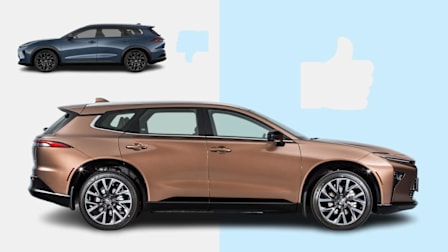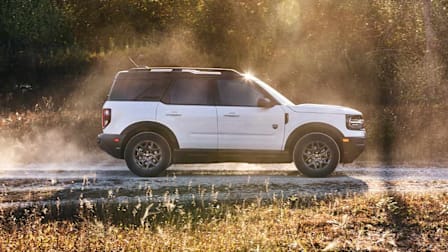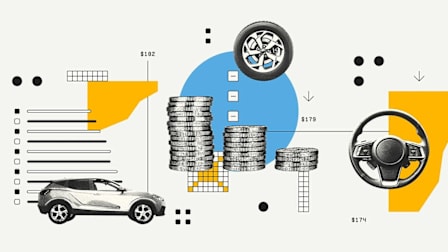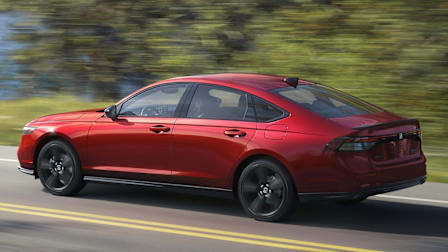Who Makes the Most Reliable New Cars?
Lexus, Subaru, and Toyota lead Consumer Reports’ car brand reliability ratings, while Tesla makes a big jump and Mazda falls significantly
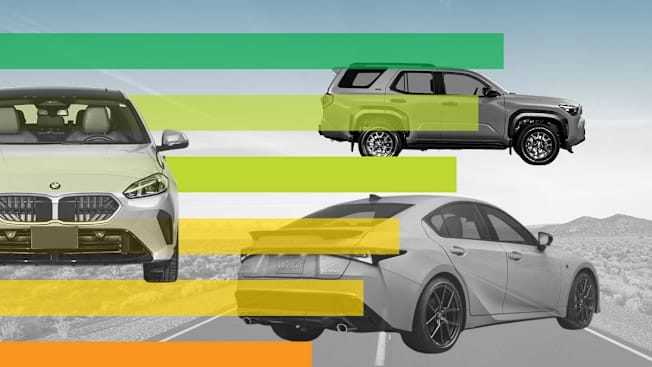
Lexus, Subaru, and Toyota are again at the top of the Consumer Reports brand reliability rankings, according to data from CR members who own vehicles from those brands. Rounding out the top five are Honda and BMW.
It’s enough of a headache to take an unreliable new car, SUV, or truck back and forth to the dealer for repairs while it’s under warranty. But once that period expires, an unreliable vehicle begins to cost owners both time and money. That’s why Consumer Reports recommends that buyers start their car-buying journey by looking at dependable brands, and then selecting a reliable model that fits their needs.
We calculate predicted reliability ratings for almost every new car, truck, and SUV on the market using data from Consumer Reports’ annual reliability surveys, in which members provide detailed reports about problems they’ve had with their vehicles. This year, we have data on about 380,000 vehicles.
The latest survey results show that all-electric (EV) and plug-in hybrid electric (PHEV) vehicles continue to be troublesome for their owners. However, hybrid models, which don’t require plugging in, continue to shine as reliable choices that also typically deliver excellent fuel economy.
Keep reading below the chart for more of this year’s key findings.
For Consumer Reports to accurately rank a brand for this year’s survey, we required data for at least two models, from a minimum of two of the 2023, 2024, 2025, or early 2026 model years. The following brands did not meet this minimum: Alfa Romeo, Dodge, Fiat, Infiniti, Jaguar, Land Rover, Lucid, Maserati, Mini, Mitsubishi, Polestar, and Porsche.
How We Score Reliability
Every year, Consumer Reports asks its members about problems they’ve had with their vehicles in the previous 12 months. This year, we have data on about 380,000 vehicles from the 2000 to 2025 model years, with a few 2026 models that were introduced early enough to be included.
Within these results, our experts study 20 specific trouble areas. This ranges from smaller problems, such as broken interior trim or software updates to fix infotainment systems, to major and potentially expensive issues that could leave drivers stranded, including engine, transmission, EV battery, and electric motor problems.
We weigh the severity of each type of problem and its impact on the owner, including expenses and the ability to drive safely. From that, we create a predicted reliability score for each new model, ranging from 1 to 100. Those scores inform the final reliability ratings we assign to nearly every available new model on the market. (To calculate a vehicle’s Overall Score, we combine the reliability rating with data collected from our track testing, as well as our owner satisfaction survey results, safety features, and crash-test data.)
The number of trouble spots we track varies by powertrain type. Here’s the breakdown:
• Internal combustion engine (ICE) vehicles: 17 potential trouble areas.
• Electric vehicles (EVs): up to 12 trouble areas. In place of traditional problems, such as those with the engine and transmission, trouble areas for EVs include the electric motor, EV/hybrid battery, and EV charging systems.
• Hybrids: 19 potential trouble areas. In addition to the 17 that gas-powered vehicles have, hybrids can also have issues with the electric motor and EV battery.
• Plug-in electric vehicles (PHEVs): 20 trouble areas. This includes the 17 from gas-powered vehicles, along with trouble areas related to electric motors, EV batteries, and EV charging.
Tesla's Reliability Improves Significantly
This year, Tesla made the biggest improvement in our brand reliability rankings, moving up eight spots to rank as the ninth most reliable automaker. This was partly due to the performance of the Model 3, the most reliable electric car in our survey, and the Model Y, which is the most reliable electric SUV and the most reliable electric vehicle overall in this year’s survey. Tesla’s two legacy models, the Model S sedan and Model X SUV, have average reliability. The Cybertruck pickup, however, has below-average reliability.
The automaker has been building EVs since 2011. According to our findings, even when its powertrains have been reliable, owners have reported numerous problems with the quality of the vehicles, ranging from exterior and interior panels that don’t fit properly to blemishes such as paint with embedded hair. In particular, reliability problems have prevented us from recommending the Model X, with its problem-prone power-rising doors.
This year, however, data from our members indicates that Tesla appears to have addressed many of those problems in recent years. Problem rates for body hardware, paint and trim, and electrical accessories have decreased substantially. As a result, the reliability ratings for the 3 and Y improved to average and above average, while the S and X improved to average this year.
Lexus, Subaru, and Toyota Make the Most Reliable Vehicles
While the order has been shuffled, the same automakers remain at the top of our brand ratings for the second consecutive year. Each brand follows similar principles that increase reliability, including using shared components across the model line and making conservative, incremental changes when redesigning a vehicle.
However, no automaker is immune to the issues associated with manufacturing a new model. In recent years, Toyota has seen its share of models with lower reliability ratings following a redesign. For example, the midsized Camry sedan’s rating dropped to average in last year’s survey after a redesign for the 2025 model year. While it had a reliability score of 56 last year, this year it’s moved up to 74, tied with the Honda Accord for the second best in the category, behind the Toyota Crown.
Last year, the Tacoma and Tundra pickup trucks had below-average reliability. The Tundra, introduced as a 2022 model, had an all-new platform with new engines, and it subsequently took Toyota time to address the problems in its manufacturing. This year, our data indicates that the Tundra has improved to the point that the 2026 model has average predicted reliability.
The Tacoma had a quicker turnaround. Toyota redesigned it for the 2024 model year, and improved its below-average score last year to above average in this year’s survey.
The rest of Toyota’s lineup has average or better reliability, with six models appearing among the 10 most reliable cars in this year’s survey. With the improvement of those models, and with good reliability for the new Land Cruiser and redesigned 4Runner SUVs, the brand moved to the top of CR’s rankings this year.
Subaru dropped one spot from last year, coming in as the second most reliable automaker in this year’s survey. The Impreza is the brand’s most reliable model, and the similar Crosstrek is ranked as the third most reliable. The Forester Hybrid has just above-average reliability, while the regular Forester’s score was average. The sporty BRZ coupe and the Impreza-based WRX sports car have above-average reliability. Subaru’s lowest-scoring model is also its oldest, the three-row Ascent SUV, which has average reliability this year.
Lexus is Toyota’s luxury line, and many of its models use the same platforms and powertrains as those from the mainstream brand. Every model has a reliability rating of average or better, led by the IS sports sedan, which has well-above-average predicted reliability. The three most reliable luxury small SUVs are the Lexus NX, NX Hybrid, and UX. The TX tops the luxury midsized three-row SUV category, and the Lexus RZ has the best predicted reliability among luxury electric SUVs.
Hybrids Remain Reliable, EVs and PHEVs Less So
Again this year, hybrids are more reliable than pure EVs and PHEVs. A majority of hybrid cars, minivans, SUVs, and trucks—which combine a gasoline engine with a small electric motor and battery—have average or better reliability in this year’s survey.
Hybrids are more complex than a vehicle with just an internal combustion engine. However, some automakers—particularly Toyota, but also Hyundai and Kia—have been building them for such a long time that their hybrid versions often have reliability that is similar to or better than the gas-only versions. The hybrid versions also get better fuel economy and often drive better than the gas-only version. This is why we routinely see hybrid versions of a model outscore the nonhybrid in our vehicle ratings.
This year, the Ford F-150 Hybrid, Kia Carnival Hybrid, and Toyota Grand Highlander Hybrid have the best reliability of their respective categories. The Honda CR-V Hybrid, Lexus NX Hybrid, and Subaru Forester Hybrid had strong results, as well, scoring near the top of their respective categories. The improvement of the Ford F-150 Hybrid and Escape Hybrid to average reliability is noteworthy because both were among the least reliable models in last year’s survey.
Of the approximately 30 hybrids for which we have data, only the Hyundai Sonata Hybrid and Lincoln Nautilus Hybrid have below-average predicted reliability ratings.
However, EVs and PHEVs continue to have more mixed and nuanced reliability results. Of the 26 brands in this year’s ranking, 13 of the least reliable models are either an EV or a PHEV. Not a single hybrid model appears on that list. Kia is a good example of this difference: Its most reliable model is the new for 2025 Carnival Hybrid, while the EV9 electric three-row SUV is its least reliable model.
Hyundai, Kia, and Genesis are part of the South Korean-based Hyundai Motor Group and liberally share designs and components across its vehicles—similar to Toyota and Lexus or Honda and Acura. When it works, this strategy can yield incredible savings, ranging from design and manufacturing to inventory and warehousing costs. But when trouble arises, it can ripple across product lines. In this case, the three Korean brands share a critical electrical component in their EVs called the integrated charging control unit (ICCU). For the past few years, survey data has indicated that this component has been causing reliability problems in the Hyundai Ioniq 5 and Kia EV6. In this year’s survey, owners reported issues with it in the Genesis GV60 and the Ioniq 6, which have average reliability.
Many of the EVs that use General Motors’ Ultium platform have below- or well-below-average reliability, including the Cadillac Lyriq and Optiq, the Chevrolet Blazer EV, and the Honda Prologue, which is the result of a partnership between GM and Honda. Last year, the Lyriq and Blazer EV were among the lowest-scoring models in our survey. The Chevrolet Equinox EV is the only Ultium-based model with average reliability.
Both Rivian and Lucid continue to struggle to produce reliable vehicles. These EV-only automakers are relatively new to the market and continue to face similar quality and EV powertrain issues that Tesla encountered in its early years.
The plug-in hybrid version of a given model tends to have worse reliability than the gas-only and/or hybrid versions. This includes the BMW X5 PHEV, Ford Escape PHEV, Kia Sportage PHEV, Lexus NX PHEV, Lincoln Corsair PHEV, Mitsubishi Outlander PHEV, Toyota Prius PHEV, and Volvo XC60 PHEV. These models all have average reliability but score worse than the gas-only and/or hybrid versions of the model. The Hyundai Tucson PHEV is a few points ahead of the Tucson Hybrid, although both are significantly behind the Tucson’s gas-only version, which is the most reliable compact SUV in this year’s survey. The Jeep Grand Cherokee has consistently scored below average, while the Grand Cherokee PHEV fares worse: It has well-below-average reliability.
Mazda’s new midsized SUVs, the CX-70 and CX-90, are available with both gas-only and PHEV powertrains. However, these SUVs continue to suffer from many of the same problems that we observed last year, significantly hurting the brands’ rankings.
Mazda’s Precipitous Drop
The automaker that saw the biggest drop in CR’s New Car brand reliability ranking was Mazda, which fell eight spots compared with last year’s results. Its legacy models scored well, with the Mazda3 sedan and hatchback rating above average, while the CX-30, CX-50, and CX-50 Hybrid SUVs scored average.
But the brand continues to have poor reliability with both the conventional and PHEV versions of the CX-70 and CX-90 SUVs. All models scored below or well below average.
While automakers such as Toyota and Subaru take a conservative approach to redesigns, using existing platforms or powertrains, Mazda went in the opposite direction. The CX-70 and CX-90 use a new engine and transmission, and a new rear-wheel-drive-based platform (even though the SUVs have standard AWD). Each is also available as a PHEV—the automaker’s first plug-in hybrid models. The result is a continuation of the problems observed in last year’s survey, particularly for the PHEVs, which continue to have issues with their EV batteries and EV motors.
Mazda’s brand reliability took a further hit, in part because the CX-5 SUV, which has proved to be very reliable over the past 11 years, is being redesigned and therefore isn’t counted in our new-car predicted reliability ratings for 2026.
Don’t Be First on the Block
No matter what type of vehicle you’re interested in, it pays to wait. If you want to avoid reliability issues, don’t buy an all-new or redesigned model.
The brand-new Cadillac Lyriq and Optiq, Honda Prologue, and Lincoln Nautilus Hybrid score below average. The Chevrolet Equinox and GMC Terrain compact SUVs and the GMC Acadia midsized SUV, which were redesigned for the 2025 model year, have well-below-average reliability scores. The Buick Enclave and Chevrolet Traverse midsized SUVs, which were redesigned for the 2024 model year, are below-average.
Even models that underwent updates instead of full redesigns have teething pains, which was the case with the Hyundai Sonata Hybrid and the Ram 1500.
Even the second-year examples of a new model can have issues. When a car has a low score in its first year, it sometimes takes its automaker more time to address the problems. For example, both the gasoline and PHEV versions of the Mazda CX-70 and CX-90 remain unreliable in their second year, as do the Cadillac Lyriq, Chevrolet Blazer EV and Colorado, and the GMC Canyon.
How the Regions and Car Types Compare
Asia-based automakers continue to lead the industry in reliability, with an overall average score of 56 for the region on a scale of 1 to 100. This year, they account for seven of the 10 most reliable brands. The Honda Passport, Lexus IS, and Toyota 4Runner scored well above average.
European automakers rank second with a score of 50. Only BMW made our list of the top 10 most reliable brands, and its 2 Series was the highest-scoring European model in this year’s survey.
Domestic (U.S.) brands trail both with an average score of 41, although that’s an increase from 2025. The highest-scoring domestic brand is Buick in eighth place, with Tesla improving to ninth place, a jump of eight positions. But both of Rivian’s models still have well-below-average reliability. The five lowest-scoring brands are domestic automakers: Chrysler, GMC, Jeep, Ram, and Rivian.
This year, among U.S. brands, the Tesla Model Y scored well above average, while the Buick Envision, the Chevrolet Corvette and Trax, and the Ford Bronco Sport and Maverick scored above average.
The cars category, which covers sedans, hatchbacks, and wagons, remains the most reliable vehicle type, with an average reliability rating of 58 (on a scale of 0 to 100). SUVs and minivans are tied for second place at 46, while pickup trucks came in last at 44.
Talking Cars on Car Reliability
More on Cars by Brand
• Which Car Brands Make the Best Vehicles?
• Owner Satisfaction Ratings: Best and Worst Car Brands
• Which Brands Make the Best Used Cars?
• Which Car Brands Have the Highest Road-Test Scores?
• Safest Car Brands Ranked by CR’s Safety Verdict
• Who Owns Which Car Brands?
• Car Brands Ranked by Maintenance and Repair

